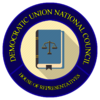Politics of the Democratic Union of British States
This article may require cleanup to meet MicroWiki's quality standards. The specific problem is: short. |
| Democratic Union of British States |
 This article is part of the series: |
|
|
| Constitution |
|---|
| Federal Government |
|
Executive
Lord President Lord Vice President Federal Cabinet Legislative
Chamber of Designees Meritocratic Chamber Judiciary
National Constitutional Court Political parties
Conservative and Democratic Party • Socialist-Green Party • DUBS Independence Party |
The Democratic Union of British States is a federal republic in which the Lord President, the National Council and the federal courts share powers delegated to the national government. Theoretically, the Constitution of the country divides powers between the state and federal governments; however, in practice, the federal government exercises wide authority over the running of the country due to a deficit of government officials at the state level.
The executive branch of the country is headed by a Lord President. The office is formally independent of both the judiciary, headed by the National Constitutional Court, and the legislature, though there is no law preventing a Lord President from sitting in the National Council or being a member of the judicial branch. The Cabinet, made up of the department heads the Lord President nominates and the Lord Vice President, assists the Lord President in the day-to-day running of the federal government.
Legislative power is vested in the National Council, which nominally is a tricameral legislature made up of the House of Representatives, the elected branch of the legislature, the Chamber of Designees, the membership of which is appointed by the King of the Edenic Compact, and the Meritocratic Chamber, which is made up of all persons who, under the Political Gamification Act, have reached Level 4 or higher and opt in to be a member. Under the Constitution, all three branches must agree before a bill can become law; however, in practice, only the House of Representatives currently has an actual membership, meaning legislative consent is assumed in the case of the other two chambers on all matters once the House passes substantive legislation.
The judicial branch is composed of the National Constitutional Court and subordinate federal courts. The judiciary is responsible for scrutinising legislation, departmental and agency actions, regulations and executive orders - orders passed by the Lord President which have force of law - for compliance with the Constitution and superior federal laws.
The full layout of the Government is explained in the Constitution.
While the National Council has historically been split four ways between the three established political parties - the Conservative and Democratic Party founded by Horatio Eden, the Socialist-Green Party of Ava Neasa and the DUBS Independence Party of Stephen Freayth - and a contingent of independent members, the Conservative and Democratic Party has historically dominated Democratic Union politics. The CDP has always controlled the Lord Presidency - though the position has yet to be subject to an election, the next of which is slated to occur on May 22nd, 2017 - and has been responsible for all legislation to have passed the legislature in the Democratic Union's history.
The Democratic Union is a member state to the Edenic Compact. The treaty creating the Edenic Compact gives the Democratic Union of British States the authority to transact foreign and domestic affairs on behalf of the other party to the treaty, the Free City-State of Edenopolis, but not to enforce the Constitution on it.
